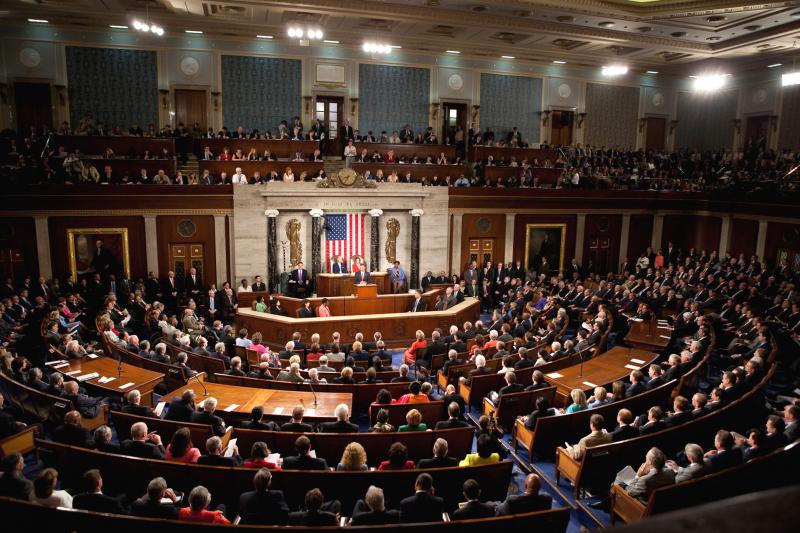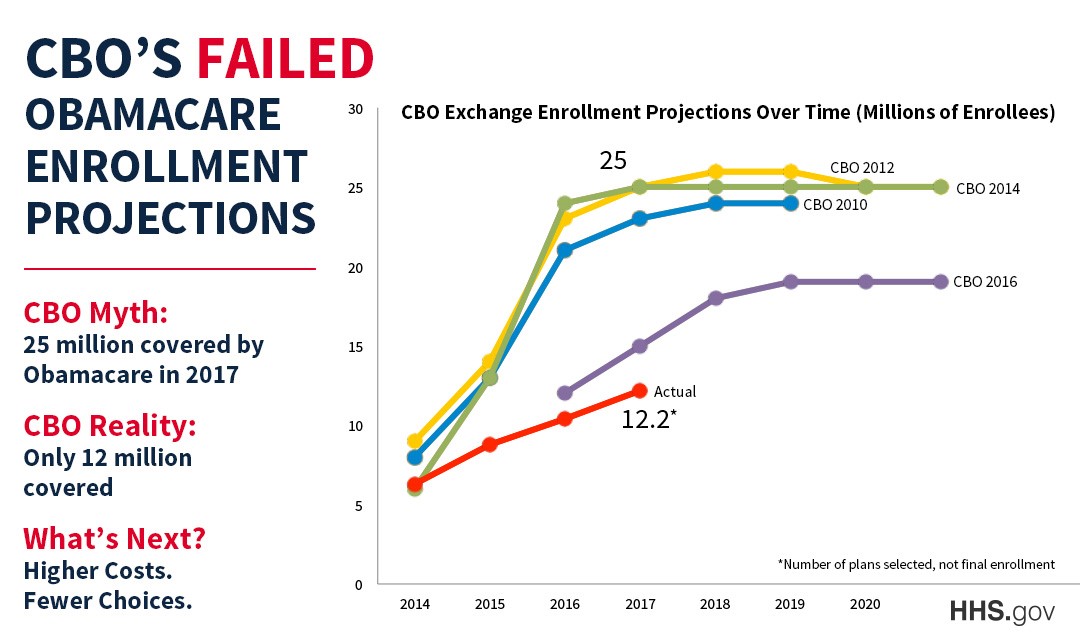
The Congressional Budget Office (CBO) analysis for the House-passed American Health Care Act (AHCA) predicts that the legislation will reduce taxes by $992 billion over the decade, a big win for taxpayers. The CBO score also says that 23 million will lose health insurance in the next decade, however CBO has a history of failure when it comes to predicting health coverage. Over the past few years, the CBO model has proven to be highly flawed as they previously overstated the number of Obamacare enrollees by over 100% (or 12 million Americans). Bizarrely, the CBO continues to use the same failed model to evaluate the AHCA.
In 2012, the CBO estimated that by 2017, 25 million Americans would enroll in Obamacare. The actual number of plans selected in that time was less than half the CBO’s projection, totaling just 12.2 million. Even the 12.2 million number likely overstates the success of Obamacare as this number included enrollees that failed to pay their health care premiums.

Moreover, the CBO does not use the actual number of Obamacare enrollees (approximately 12.2 million) to determine how many people will lose coverage under the AHCA. Instead, it bases its analysis on the CBO 2016 enrollment prediction for 2018 (18 million).
As ATR President Grover Norquist explains, CBO’s numbers differ greatly from reality: “they’re counting the numbers who lose health care from numbers that don’t exist. They’re really working off of their own previous lousy numbers, which they haven’t fixed.”
If the CBO report were correct, millions more people would lose health insurance in one year with the AHCA than gained health insurance over the many years of Obamacare. This result is illogical and clearly inaccurate.
Previous scores by the CBO, too, have vastly overstated the number of Americans who would lose coverage as a result of Obamacare repeal. Avik Roy, President of the Foundation for Research on Equal Opportunity, argues in Forbes Magazine that the CBO overemphasizes the role of the individual mandate in a person’s decision to enroll in health insurance. Roy writes:
CBO on the other hand believes that, due to the AHCA’s repeal of the individual mandate, 14 million people would choose to go uninsured in 2018, and 16 million in 2019. Of the 14 million accounted for in the 2018 figure, 6 million would drop out of the individual market, 5 million from Medicaid, and 2 million from employer-based coverage.
Remember that Medicaid is basically free to the eligible enrollee. There are no premiums, and almost no co-pays or deductibles. The value of the Obamacare Medicaid subsidy is about $6,000 per enrollee per year. And yet, CBO believes that 5 million people will only enroll in Medicaid because the individual mandate forces them to. Given the difficulties in enforcing the mandate for low-income populations, this is highly unlikely.
Roy estimates that the CBO’s famed estimate that 24 million people would lose health insurance under the AHCA may be off by as many as 19 million people.
According to a report by Department of Health and Human Services (DHS), the CBO makes other vital miscalculations affecting their health care predictions. The report notes:
CBO’s misplaced belief in the power of the individual mandate to compel young and healthy people into markets has caused them to underestimate premium hikes. Early state filings for 2018 have reflected increases of 20-50%, while the CBO baseline projected a much more stable exchange market. The CBO uses this assumption to claim that AHCA premiums will be higher over the next two years.”
The CBO ignores the fact that premiums are increasing under the status quo system of Obamacare, instead misattributing these higher rates to the AHCA.
In fact, the average premium for an individual has increased by 105% since 2013.
Year after year, the observed effects of Obamacare continue to shock and surprise the experts at the CBO. To quote the DHS report:
The Congressional Budget Office is full of great, hardworking folks. But that doesn’t change the fact that they were wrong about Obamacare and they are wrong now. We shouldn’t base our treatment plan on a failed diagnosis, and the CBO’s projections on Obamacare have all been pretty far off the mark.
Photo credit: whitehouse.gov

